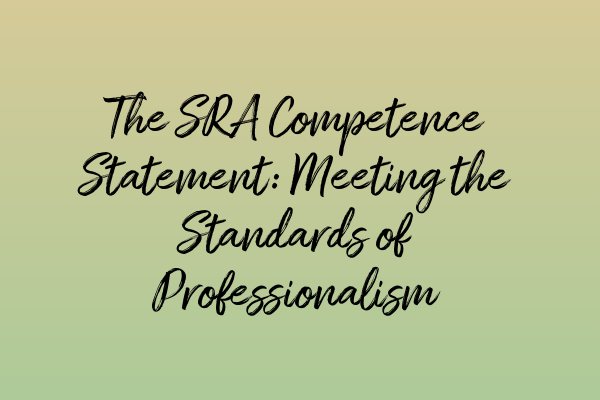The SRA Competence Statement: Meeting the Standards of Professionalism
As solicitors, we have a duty to uphold the highest standards of professionalism and competence. This not only ensures that we provide the best possible legal representation for our clients, but also maintains the integrity of the legal profession as a whole. The Solicitors Regulation Authority (SRA) has set out the Competence Statement, which outlines the skills, knowledge, and attributes that solicitors need to demonstrate in order to meet these standards.
At Become Solicitor SRA, we understand the importance of adhering to the SRA Competence Statement. In this blog post, we will explore the Competence Statement in detail and discuss how solicitors can ensure they meet its requirements.
The SRA Competence Statement is divided into three main areas: ethics, technical legal practice, and professional skills. Let’s delve into each of these areas and understand what they entail.
Ethics:
Ethics form the foundation of the legal profession. It is imperative that solicitors act in a way that is honest, trustworthy, and in the best interests of their clients. This includes maintaining client confidentiality, avoiding conflicts of interest, and acting with integrity at all times. Upholding ethical standards is not only a requirement set out by the SRA, but it is also crucial for building trust and credibility with clients.
Technical Legal Practice:
As solicitors, we must have a solid understanding of the law, keep up-to-date with relevant legal developments, and possess the necessary technical skills to apply legal principles effectively. This includes having a comprehensive knowledge of various areas of law, such as criminal law, civil law, and commercial law. It also involves being able to analyze complex legal issues, provide accurate advice, and effectively represent clients in legal proceedings.
To gain a deeper understanding of criminal law, for example, you can explore our related article on “Private Prosecutions: Exploring Non-Governmental Prosecutions in Criminal Cases.” This article delves into the topic of private prosecutions and provides valuable insights into this aspect of criminal law.
Professional Skills:
In addition to ethical considerations and technical legal knowledge, solicitors must also possess a range of professional skills to effectively serve their clients. These skills include effective communication, negotiation, legal research, problem-solving, and time management. Honing these skills is vital in order to provide a high level of service to clients and to navigate the complexities of the legal profession.
If you are interested in enhancing your knowledge of criminal law procedures, our related article on “Demystifying Criminal Law Procedures: A Step-by-Step Guide” offers a comprehensive overview of the various stages involved in criminal proceedings.
In conclusion, meeting the standards of professionalism set out in the SRA Competence Statement is essential for solicitors. By adhering to ethical guidelines, maintaining technical legal competence, and developing professional skills, we can provide the best possible legal representation for our clients and contribute to the overall reputation of the legal profession.
If you require legal advice or representation in criminal law matters or wish to explore topics related to criminal law, such as drug-related offences and criminal defense strategies, consider reading our related articles “Understanding Drug-related Offences: Laws and Penalties in the UK” and “Criminal Defence Strategies: Expert Approaches to Protecting Clients’ Interests.”
At Become Solicitor SRA, we are committed to helping solicitors meet the standards of professionalism set out by the SRA Competence Statement. Contact us today for expert guidance and support in your legal career.


Leave a Reply